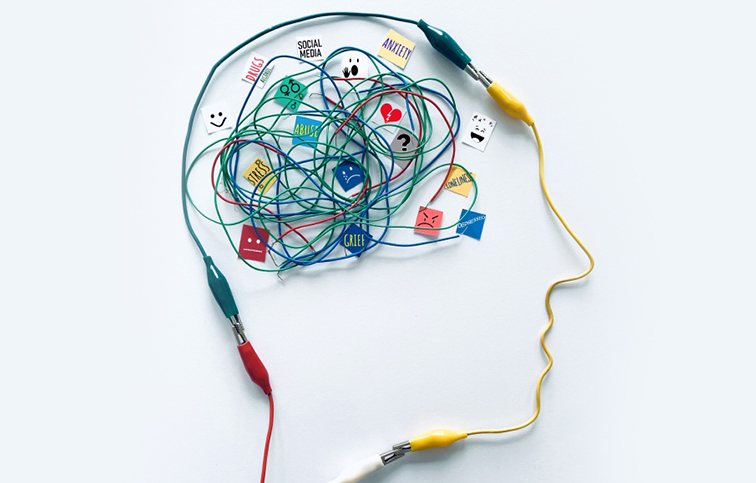Muscat: ‘It’s just a headache; I don’t need to see a doctor.’
‘I am not in the mood; let me sleep it away.’
‘Sorry, I have no appetite…another time, maybe.’
Read More
- Why don’t more women participate in cardiac rehabilitation?
- Toxic Positivity: When “Stay Positive” Gets in the Way
- Embracing Omani parent’s culture: A Paragon to a Healthy Living
- We have plans to introduce robotic surgery in Oman, says Dr. Azad Moopen
- 175-bed multispecialty Aster Royal Al Raffah Hospital opens in Al Ghubra
‘I do not have the energy to step out.’
These might sound like everyday excuses, even pertinent ones at that, but could they also hide a pulsating need to overcome all the so-called ‘minor’ issues to savour wholesome mind and body health?
Often, what come out as excuses may well be shields to cover up mental stress and moan behind an ‘all is well’ façade. Forgetting that what ails the mind can affect the body (there are studies to show that people with severe mental health conditions die prematurely, nearly two decades early, owing to preventable physical conditions).
Although the stigma that clung to mental illness for long is slowly loosening its grip, persuading people to seek ‘redemption’, so to speak, it is still not common for folks to talk about everyday mental strife. There is still an inexplicable hesitancy to give ‘mind’ the attention that we give to our body. We are not ready to acknowledge that we have forgotten to nourish our minds in our pursuit for career and professional development.
For we are humans, and it is our human nature to occupy minds with trains of thoughts; thoughts that rarely, if ever, halt at any station. We let our thoughts consume us; lead us to unlit zones that are difficult to trudge on. And we forget that the torch to illuminate the path is right in our hands; we ignore the fact that mental health is our right.
But for now, let’s remember that the decision to exercise that mental health right solely depends on us.
Mental health is a basic human right, which as campaigners of the ‘right’ point out, includes the prerogative to be protected from mental health risks and the option to avail accessible and quality care.
The time is now to press the pause button on inertia and shift gears to action. Statistics tell us that mental health and substance use disorders affect 13 percent of the world’s population; one in eight people globally are living with mental health conditions that can have adverse effect on overall health and even livelihood; the number is also increasing among adolescents and young adults.
And, as a universal right, mental health condition can never be a reason to deprive yourself of your basic human rights or to get excluded from decisions about your own health.
Make time for your mental health and physical wellness.
“Mental health encompasses several essential aspects of our well-being,” states Avni, pointing out that it involves how we feel emotionally, how we think and process information, and how we interact with others. “These components work together, like pieces of a puzzle, to determine our overall mental well-being,” she adds.
She describes mental health as an invisible shield that protects mind and emotions to help one navigate life’s challenges – big and small – so as to bounce back from difficult situations. “Good mental health isn’t just about feeling happy all the time; it’s about having the inner strength to handle whatever comes your way, the power to overcome obstacles and find contentment even when faced with adversity,” she points out.
Read on to find out more from Avni on mental health and the resources available to strike a balance between mind and body.
Common reasons to seek mental health counseling/therapy:
Emotional Distress: When people are feeling upset, overwhelmed, or emotionally distressed, they may seek therapy to find relief.
Life Challenges: Therapy can help individuals navigate difficult life situations and transitions, offering guidance and coping strategies. Learning how to manage stress and build resilience is a common goal for therapy seekers.
Mood Concerns: Persistent feelings of sadness, anxiety, or anger may lead individuals to therapy to improve their emotional well-being.
Behavioral Challenges: Individuals looking to change certain behaviors, habits, or patterns often find therapy helpful in making positive adjustments.
Life Transitions: Major life changes like starting college, getting married, or becoming a parent can trigger the desire for therapy to navigate new experiences.
Support System: Therapy offers a supportive and non-judgmental space where individuals can express themselves and receive guidance.
Stigma surrounding mental problems:
Stigma is still a major concern for people approaching mental health experts because it often leads to fear of judgment and discrimination. Many individuals worry that seeking help for their mental well-being may lead others to view them differently or label them negatively. This fear of stigma can be a barrier to accessing the support and care they need.
Changes in societal perspectives:
Over the years, there has been a noticeable shift in how society perceives and understands mental health. In the past, mental health issues were often misunderstood or stigmatized. People might have been hesitant to talk about their struggles due to fear of being judged or marginalized. However, with increased awareness, education, and advocacy, there has been a positive change in societal attitudes towards mental health. Nowadays, there is a growing recognition that mental health is just as important as physical health. However, there is a need for further improvement, including increased conversations, education, and awareness about mental health across all strata of society.
Risk factors for developing depression during childhood/adolescence:
Family History: Having a family history of depression or other mental health conditions can increase the risk.
Stressful Life Events: Experiencing significant stressors, such as trauma, loss, or family conflicts, can contribute to depression.
Bullying or Peer Pressure: Exposure to bullying, peer pressure, or social challenges can impact emotional well-being.
Academic or Social Struggles: Difficulties in school or challenges in social relationships can play a role.
Lack of Support: Limited access to a support system or inadequate emotional support can increase the risk.
Impact of lifestyle and diet on mental health:
How we live our lives, including factors like physical activity, sleep patterns, and stress management, can impact mental health. Regular exercise, getting enough rest, and practicing stress reduction techniques can contribute to better mental well-being.
Diet matters too. A balanced diet with essential nutrients can positively affect mood and cognitive function. On the other hand, a poor diet, high in sugar and processed foods, can contribute to mood swings.
Environmental factors:
The environment exerts a multifaceted influence on our mental health. Physically, living in a safe and secure environment with access to clean air, water, and nourishing food is paramount for reducing stressors that can adversely affect mental well-being. Socially, a supportive network of family, friends, and community bolsters emotional resilience, reduces isolation, and fosters open communication about mental health. Feeling safe and secure in our surroundings, both physically and socially, contributes to increased overall mental well-being.
Activities/hobbies for overall wellbeing:
Physical Activity: Engaging in any form of physical activity, whether it’s walking, swimming, dancing, or playing a sport, can boost mood, reduce stress, and improve overall health.
Mindfulness and Relaxation: Practices like meditation, deep breathing, or simply taking moments of quiet reflection can enhance mental clarity and reduce stress.
Spending Time in Nature: Being in natural environments, through hiking or leisurely walks, can promote relaxation and a sense of connection with the world around us.
Creative Expression: Activities like painting, writing, crafting, or playing musical instrument provide outlets for self-expression and relaxation.
Helping Others: Volunteering or acts of kindness towards others can boost feelings of fulfillment and purpose.
Social media and mental health:
Social media can be a bit like a double-edged sword for our mental health. It’s great for staying in touch with friends and learning new things. But, on the flip side, it can sometimes make us feel bad about ourselves when we see everyone’s seemingly perfect lives. It can also be a magnet for mean comments and cyberbullying, which can really hurt. Spending too much time on social media might disrupt our daily routines and make us feel stressed. Plus, worrying about privacy and online security can add to our stress. To keep our mental health in balance, it’s important to use social media wisely, take breaks, and avoid comparing ourselves too much with others online.
Stress triggers:
Think of stress like a heavy backpack you carry. If it gets too heavy or you wear it for too long, it can make you tired and even hurt your back. Similarly, stress can weigh on your mind and emotions. It can make you feel worried, sad, or anxious. If it keeps piling up, it might even make these feelings worse or cause new ones. So, just as you’d take off that heavy backpack to feel better, it’s important to find ways to “unload” or manage stress for a healthy mind.
Tips/suggestions for positive mental health:
- Take care of your body with exercise and good food
- Find ways to relax and unwind
- Talk to someone you trust if you are feeling down
- Don’t keep your feelings locked up – share them
- Remember, it’s okay to ask for help when you need it.
Support system:
Having a support system is like having a safety net for our mental health. Friends, family, and mental health experts can all play a crucial role in helping us deal with tough times. They provide a listening ear, offer advice, and give us a sense of belonging. When we know we’re not alone in our struggles, it can make a big difference in how we feel. They can help us find the right path to recovery and offer comfort when we’re down. So, having people who care about us can be a big boost for our mental well-being.
Guidelines for people struggling with mental health:
You’re Not Alone: First and foremost, remember that you’re not alone in your struggles. Many people face mental health challenges at some point in their lives, even if it doesn’t always seem that way.
Acceptance and Understanding: Understand that struggling with mental health is not a sign of weakness. It’s a part of the human experience, and it’s okay to seek help when needed. Be kind and patient with yourself.
Reach Out: Don’t be afraid to reach out to someone you trust. Whether it’s a friend, family member, or a mental health professional, sharing your feelings and experiences can provide immense relief and support.
Self-Care is Crucial: Taking care of your physical and emotional well-being is essential. Prioritize self-care activities that make you feel better.
Avoid Self-Criticism: Negative self-talk can be incredibly damaging. Challenge those critical thoughts with self-compassion and positive affirmations.
Seek Professional Help: If your struggles persist or worsen, consider seeking help from a mental health professional. They have the expertise to provide guidance and support tailored to your specific needs.







